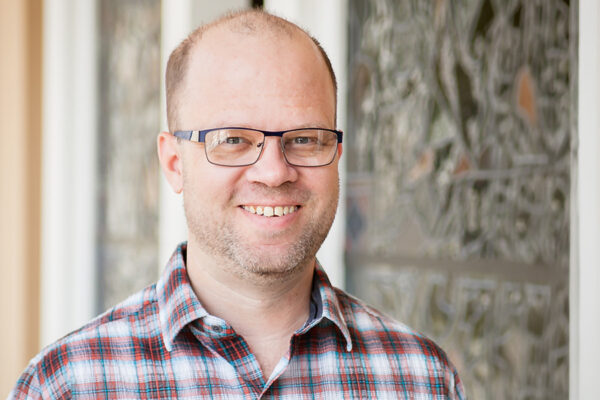Miss Mary Nelson
As with many old books, its character doesn’t come just from being old and worn but from the clues it gives about the people who first read it. According to the loopy cursive inside the front cover, a Miss Mary Nelson spent 25 cents on this tiny handbook of faith, officially titled: Dr. Martin Luther’s Small Catechism, with Explanation.
For me, the real joy of this 1922 catechism isn’t simply in the typed words that articulate belief and trust in God. The surprising delight of this particular catechism is found inside the back cover.
There you see how Miss Mary Nelson took some notes about John who was “one of the followers of Jesus.” She reminded herself to “write a prayer & turn in on
Wed.” But then, further down, Miss Mary Nelson comes to life in my imagination, with the simple little note: “ask Flo what Helen told her.” And “Thurs. Dinner at the parsonage.”
It brings me such joy, imagining her in a church basement holding her Bible and catechism, thinking not just about the Lord’s Prayer but about her friends. I can see her sitting at the parsonage dining room table with a meal on the pastor’s best dishes. She reminds us that our faith is not only formed by the most perfectly articulated theology. Faith is shaped in and through relationships.
I’d be willing to bet that when Miss Mary Nelson looked back upon her life, decades later, she might not remember Luther’s explanation of the Apostle’s Creed. But I’d guess that she found strength and courage in memories of that dinner on a Thursday, conversations with Helen and Flo, and the ways she came to know the promises she read about embodied in that community around her.
This month we commemorate the 500th anniversary of the Reformation. In October 1517, Martin Luther nailed a paper listing 95 arguments about what needed to change in the church. It sparked a series of events that transformed the world and the Church.
This anniversary year has been an opportunity to renew our work toward unity among all Christians, particularly those in Lutheran and Catholic communities of faith. In learning opportunities, worship and more, we celebrate the particular contributions Luther brings to our Christian understanding. Thing like how we are we are saved, or made right with God, or loved by God, not by anything we do, but because of all God has done in Jesus’ death and resurrections. And this truth that we are simultaneously saints and sinners, with the possibility of living with deep goodness and missing the mark of right living completely. And an understanding that all people can share Christ’s love in the world. And so much more.
But we celebrate this 500th anniversary not just because of ideas and brilliant theology, but because of the generations of faithful people who have followed Jesus and shared his love. People who lived with courage and generosity, who worked for justice, and boldly spoke of Christ’s grace. People like now-sainted Miss Mary Nelson, unknown to me beyond this little book, but who nonetheless shared something about Christ to me.
I’m convinced that one of Martin Luther’s greatest contributions to the Christian witness was how he worked tirelessly to dismantle anything that kept people from having deep and real relationships with God and with each other. Christianity can only happen in community, because of relationships. Our trust in the promises of God flourishes because of our trust in one another.
So as we celebrate the 500th anniversary of the Reformation, let’s commit to building real and trusting relationships and fostering community where all people can know Christ’s love. Let’s honor one another and our differences, learn from each other, and work for the thriving of the most vulnerable. We’ll never know what Helen told Flo, but like Miss Mary Nelson did on a Thursday night nearly 100 years ago, we can share a meal and our lives together, growing closer to Christ along the way.
-Sara Olson-Smith, associate pastor




